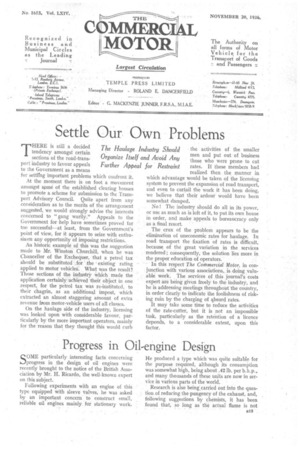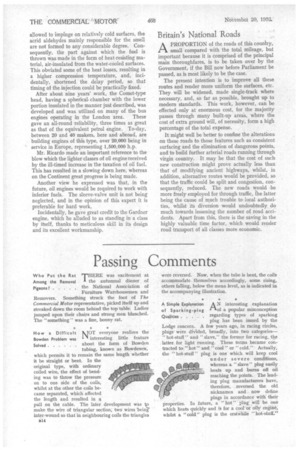Progress in Oil-engine Design
Page 27

Page 28

If you've noticed an error in this article please click here to report it so we can fix it.
SOME particularly interesting facts concerning progress in the design of oil engines were recently brought to the notice of the British Association by Mr. H. Ricardo, the well-known expert on this subject.
Following experiments with an engine of this type equipped with sleeve Valves, he was asked by an important concern to construct small, reliable oil engines mainly for stationary work. He produced a type which was quite suitable for the purpose required, although its consumption was somewhat high, being about .42 lb. per b.h.p., afrd many thousands of these units are now in service in various parts of the world.
Research is also being carried out into the question of reducing the-pungency of the exhaust, and, following suggestions by chemists, it has been found that, so long as the actual flame is not allowed to impinge on relatively cold surfaces, the acrid aldehydes mainly responsible for the smell are not formed to any considerable degree. Consequently, the part against which the fuel is thrown was made in the form of heat-resisting material, air-insulated from the water-cooled surfaces. This obviated some of the heat losses, resulting in a higher compression temperature, and, incidentally, shortened the delay period, so that timing of the injection could be practically fixed.
After about nine years' work, the Comet-type head, having a spherical, chamber with the lower portion insulated in the manner just described, was developed and was utilized on many of the bus engines operating in the London area. These gave an all-round reliability, three times as great as that of the equivalent petrol engine. To-day, between 20 and 40 makers, here and abroad, are building engines of this type, over 20,000 being in service in Europe, representing 1,500,000 h.p.
Mr. Ricardo made an important reference to the blow which the lighter classes of oil engine received by the ill-timed increase in the taxation of oil fuel. This has resulted in a slowing down here, whereas on the Continent great progress is being made.
Another view he expressed was that, in the future, oil engines would be required to work with inferior fuels. The sleeve-valve unit is not being neglected, and in the opinion of this expert it is preferable for hard work, Incidentally, he gave great credit to the Gardner engine, which he alluded to as standing in a class by itself, thanks to meticulous skill in its design and its excellent workmanship.
Britain's National Roads
APROPORTION of the roads of this country, small compared with the total mileage, but important because it is comprised of the principal main thoroughfares, is to be taken over by the Government, if the Bill now before Parliament be passed, as is most likely to be the case.
The present intention is to improve all these routes and render more uniform the surfaces, etc. They will be widened, made single-track where necessary, and, so far as possible, brought up to modern standards. This work, however, can be effected only at enormous cost, for the majority passes through many built-up areas, where the cost of extra ground will, of necessity, form a high percentage of the total expense.
It might well be better to confine the alterations on these roads to those features such as consistent surfacing and the elimination of dangerous points, and to build further arterial roads running through virgin country. It may be that the cost of such new construction might prove actually less than that of modifying ancient highways, whilst, in addition, alternative routes would be provided, so that the traffic could be split and congestion, consequently, reduced. The new roads would -be more freely employed for through traffic, the latter being the cause of much trouble to local authorities, whilst its diversion would undoubtedly do much towards lessening the number of road accidents. Apart from this, there is the saving in the highly valuable time factor, which would render road transport of all classes more economic.




























































































